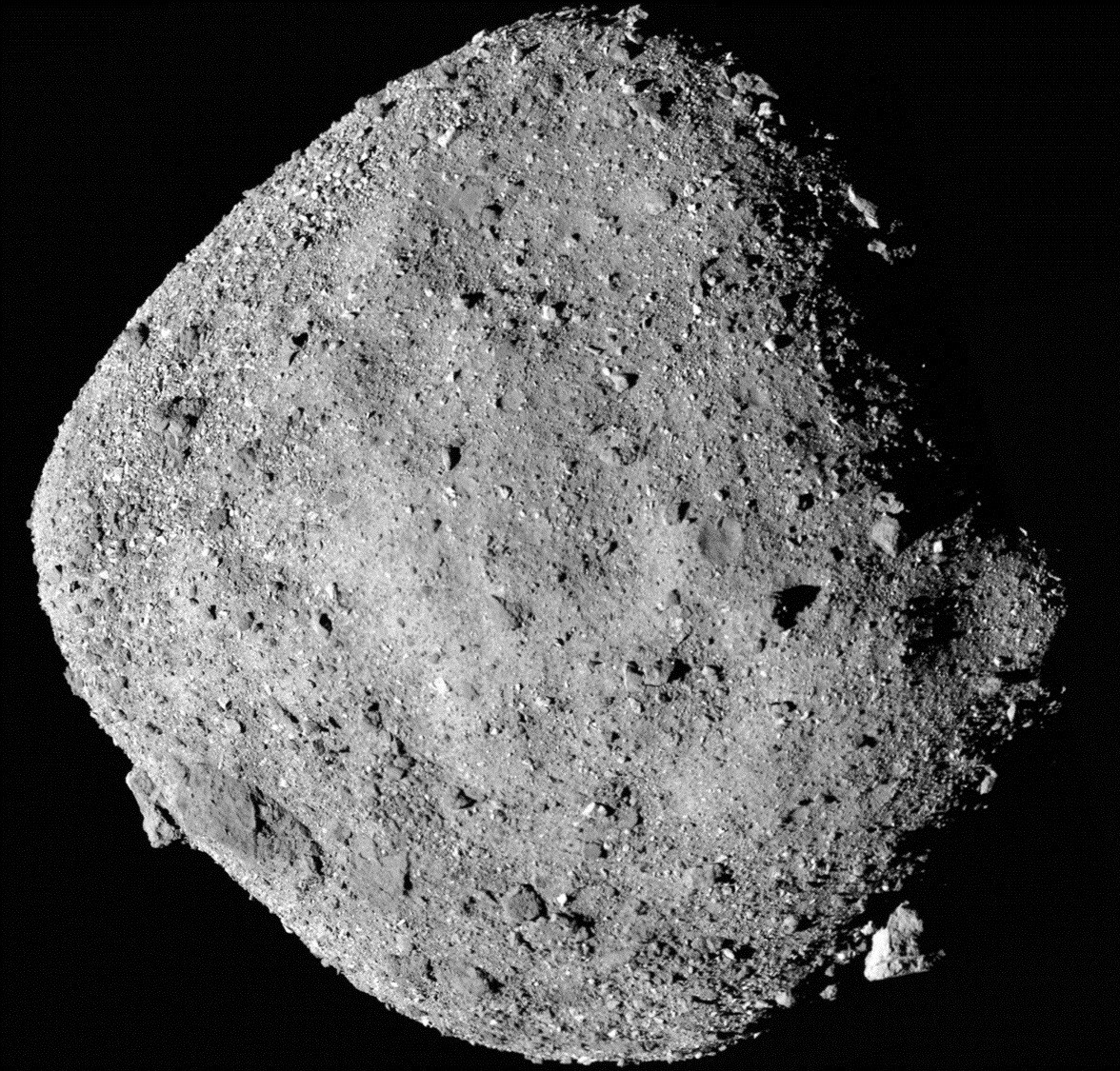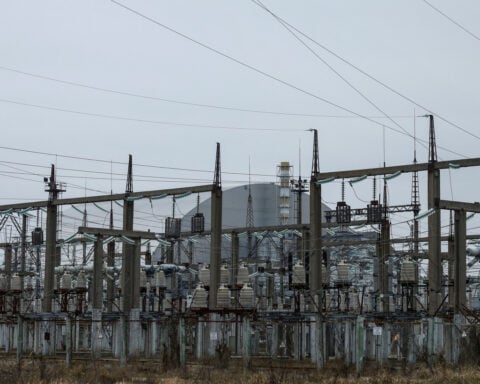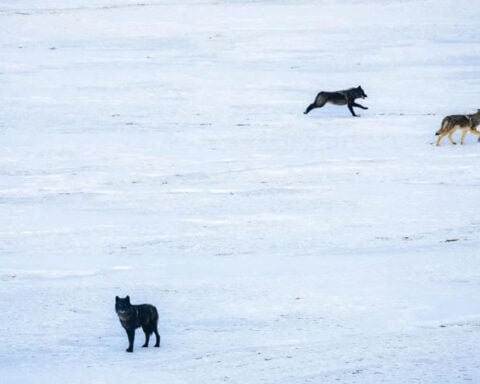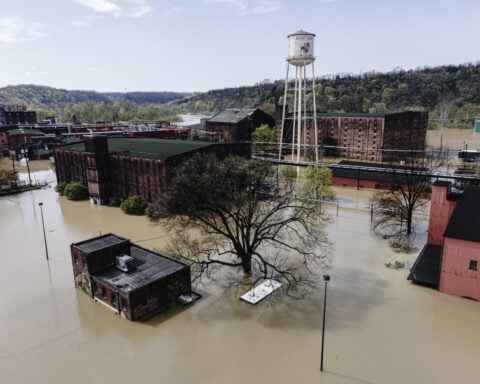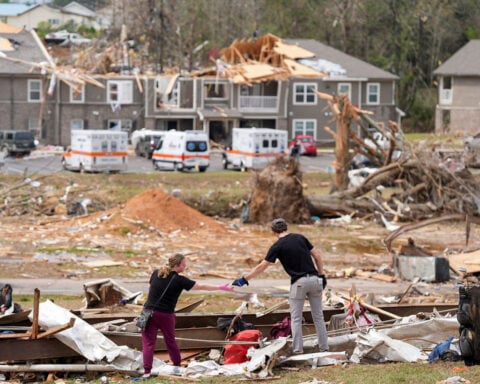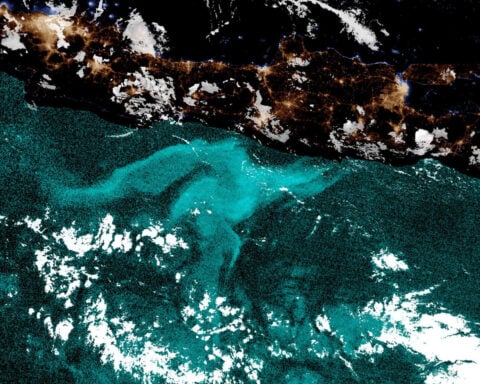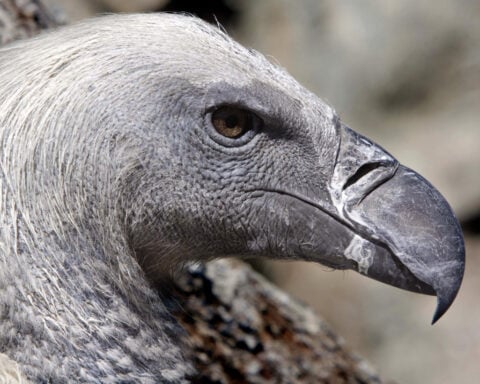By Will Dunham
WASHINGTON (Reuters) - The rocky object called Bennu is classified as a near-Earth asteroid, currently making its closest approach to Earth every six years at about 186,000 miles (299,000 km) away. It might come even closer in the future, with scientists estimating a one-in-2,700 chance of a collision with Earth in September 2182.
So what would happen should Bennu strike our planet? Well, it would not be pretty, according to new research based on computer simulations of an impact by an asteroid with a diameter of roughly three-tenths of a mile (500 meters) like Bennu.
Aside from the immediate devastation, it estimated that such an impact would inject 100-400 million tons of dust into the atmosphere, causing disruptions in climate, atmospheric chemistry and global photosynthesis lasting three to four years.
"The solar dimming due to dust would cause an abrupt global 'impact winter' characterized by reduced sunlight, cold temperature and decreased precipitation at the surface," said Lan Dai, a postdoctoral research fellow at the IBS Center for Climate Physics (ICCP) at Pusan National University in South Korea and lead author of the study published this week in the journal Science Advances.
In the worst-case scenario, the researchers found that Earth's average surface temperature would decrease by about 7 degrees Fahrenheit (4 degrees Celsius), average rainfall would fall by 15%, there would be a reduction of up to 20-30% in plant photosynthesis and a 32% depletion in the planet's ozone layer that protects against harmful solar ultraviolet radiation.
The impact of a Bennu-sized object - a medium-sized asteroid - on Earth's land surface would generate a powerful shockwave, earthquakes, wildfires and thermal radiation, leave a gaping crater and eject huge amounts of debris upward, the researchers said.
Large quantities of aerosols and gases would reach the upper atmosphere, causing years-long effects on climate and ecosystems, according to Dai and study senior author Axel Timmermann, a climate physicist and ICCP director.
The unfavorable climate conditions would inhibit plant growth on land and in the ocean, they said.
"In contrast to the rapid reduction and slow two-year-long recovery of plants on land, plankton in the ocean would recover within six months - and even increase afterward with unprecedented diatom (a type of algae) blooms triggered by iron-rich dust deposition into the ocean," Dai said.
Severe ozone depletion would occur in the stratosphere - the second atmospheric layer as you go upward - due to strong warming caused by the solar absorption of dust particles, the researchers said.
An asteroid collision of this magnitude could cause massive loss of human life, but that calculation was outside the study's scope. Dai said the potential death toll "mainly depends on where the asteroid impact occurs."
Scientists know a great deal about Bennu, considered a "rubble pile" asteroid - a loose amalgamation of rocky material rather than a solid object. It is a rocky remnant of a larger celestial body that had formed near the dawn of the solar system roughly 4.5 billion years ago. NASA's robotic OSIRIS-REx spacecraft journeyed to Bennu and in 2020 collected samples of rock and dust for analysis.
A study published in January showed that Bennu's samples bore some of the chemical building blocks of life, strong evidence that asteroids may have seeded early Earth with the raw ingredients that fostered the emergence of living organisms.
Asteroids have struck Earth occasionally over its long history, often with cataclysmic results. An asteroid estimated at 6-9 miles (10-15 km) wide hit off the coast of Mexico's Yucatan Peninsula 66 million years ago, eradicating about three-quarters of the world's species and ending the age of dinosaurs.
NASA in 2022 carried out a proof-of-principle planetary defense mission by using its robotic DART spacecraft to change the trajectory of the asteroid Dimorphos, with an eye toward doing this in the future if one appears on a collision course with Earth.
"The likelihood that a Bennu-sized asteroid will strike Earth is quite small at 0.037%. Even though small, the potential impact would be very serious and would likely lead to massive longer-term food insecurity on our planet and climate conditions that are similar to those seen only for some of the largest volcanic eruptions in the last 100,000 years," Timmermann said.
"So it is important to think about the risk," Timmermann added.
(Reporting by Will Dunham, Editing by Rosalba O'Brien)

 Trump has begun another trade war. Here's a timeline of how we got here
Trump has begun another trade war. Here's a timeline of how we got here
 Canada's leader laments lost friendship with US in town that sheltered stranded Americans after 9/11
Canada's leader laments lost friendship with US in town that sheltered stranded Americans after 9/11
 Chinese EV giant BYD's fourth-quarter profit leaps 73%
Chinese EV giant BYD's fourth-quarter profit leaps 73%
 You're an American in another land? Prepare to talk about the why and how of Trump 2.0
You're an American in another land? Prepare to talk about the why and how of Trump 2.0
 Chalk talk: Star power, top teams and No. 5 seeds headline the women's March Madness Sweet 16
Chalk talk: Star power, top teams and No. 5 seeds headline the women's March Madness Sweet 16
 Purdue returns to Sweet 16 with 76-62 win over McNeese in March Madness
Purdue returns to Sweet 16 with 76-62 win over McNeese in March Madness
